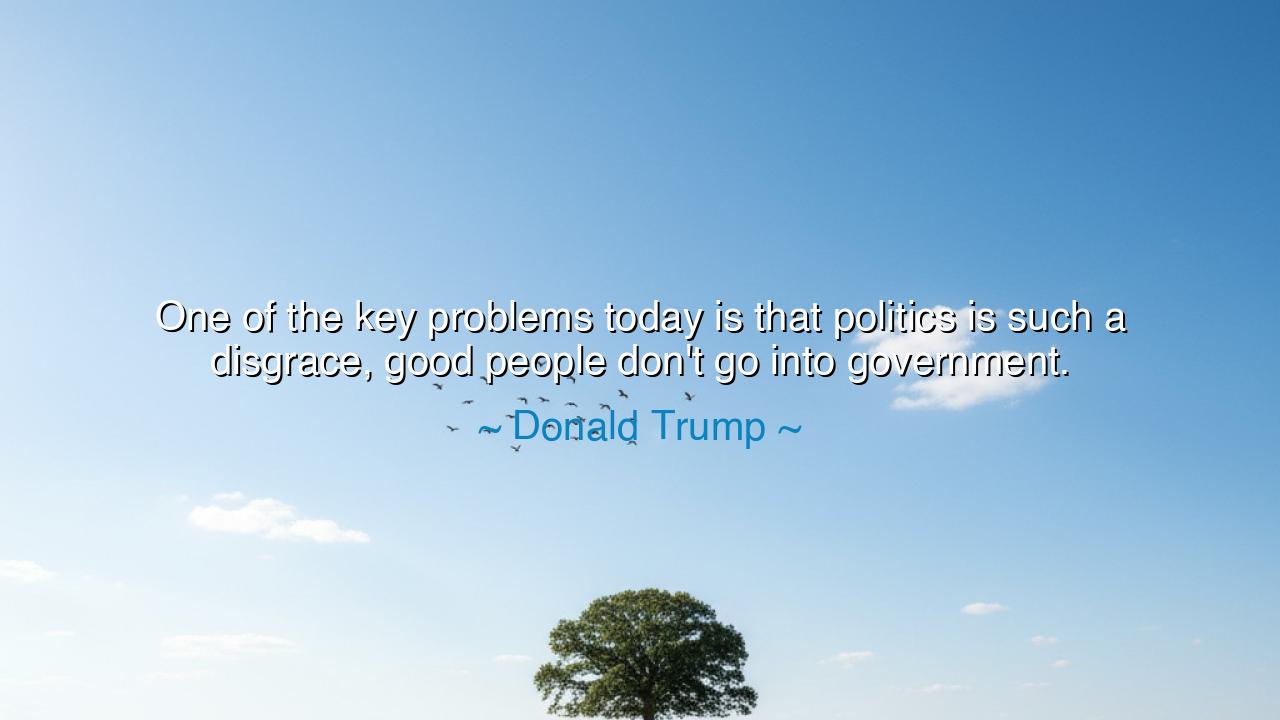
One of the key problems today is that politics is such a
One of the key problems today is that politics is such a disgrace, good people don't go into government.






"One of the key problems today is that politics is such a disgrace, good people don't go into government." — Donald Trump
Hear these words, O sons and daughters of the Republic, and consider the weight they carry. Donald Trump, a man both praised and condemned in his time, spoke a truth that reaches beyond politics and into the heart of human society. When he said, “One of the key problems today is that politics is such a disgrace, good people don’t go into government,” he was not simply criticizing a system — he was lamenting the loss of virtue within it. His words ring with both sorrow and warning: that when honor withdraws from public life, the unworthy will rule in its place, and the house of the people will be governed by those who love power more than principle.
The meaning of this saying lies in the ancient truth that corruption breeds cowardice, and cowardice allows corruption to grow. When politics becomes a place of deceit, slander, and selfish ambition, the noble-hearted turn away in disgust. They see in government not a sacred calling but a pit of venom, where integrity is mocked and virtue devoured. And so the field is left to the cunning, the greedy, and the ruthless. This, Trump warns, is the tragedy of our age — not that evil men exist, for they always have, but that good men have ceased to stand among them. For when the righteous abandon the arena, the battle for justice is lost before it even begins.
The origin of this truth is as old as civilization itself. In every age, the wise have spoken the same warning. The philosopher Plato, in the ancient days of Athens, declared that “the penalty for refusing to take part in politics is to be governed by your inferiors.” He saw, as Trump later would, that the retreat of virtue from governance ensures the victory of vice. When politics becomes so foul that only the corrupt seek office, then corruption becomes self-sustaining — a serpent that devours its own tail. The only cure, Plato said, was for the good to overcome their disgust, to step into the fray, and to reclaim the system they despise, for love of the city that raised them.
History, too, offers countless examples of this lesson written in blood and ruin. Consider Rome, once the glory of the world. In its early days, the republic was ruled by men of duty and honor — Cincinnatus, who laid down his power to return to his plow; Scipio, who fought for virtue as fiercely as he fought for victory. Yet as wealth grew and greed followed, public service became a means to personal gain. Honest men withdrew in disillusionment, leaving the Senate to the ambitious and the corrupt. Soon came the demagogues — Caesar, Antony, and the long procession of emperors who turned citizens into subjects. Thus Rome fell, not because of foreign enemies, but because its good men stopped believing their country was worth serving.
In Trump’s time, the same pattern reveals itself in new form. The “disgrace” of politics, as he called it, is not only in scandal or deceit, but in the loss of faith itself. People mock those who serve, and those who might serve best are driven away by the venom of public scorn. The press, the parties, and the people themselves turn governance into spectacle, truth into weapon, and debate into war. Thus, the nation is ruled not by its wisest, but by its loudest; not by its most selfless, but by its most shameless. Trump’s words, though born of frustration, strike at the root of the ailment: when government becomes dishonorable, the honorable abandon it — and in doing so, they surrender it to the dishonorable.
Yet his statement is not without hope, for hidden within his lament lies a challenge. It is easy to curse the darkness of politics, but far harder — and far nobler — to light a torch within it. The duty of the citizen is not to flee corruption, but to purify it. The man who recoils from government because it is corrupt is like the physician who refuses to heal because the world is sick. The true patriot must enter the arena, knowing it will soil him, but trusting that his presence will cleanse more than it stains. For government is not a place for the perfect — it is a forge for the courageous, where integrity is tested and refined by fire.
So, my friends, take this wisdom to heart: do not abandon the realm of leadership to those who crave power, but enter it for the sake of justice. Speak truth when others whisper lies; serve honor when others chase gain. If politics is a disgrace, let your own example make it noble once more. Let the good return to the councils of the people, not for glory, but for guardianship. For when the righteous lead, the nation flourishes; when the wicked rule, the people mourn. The cure for a corrupt government is not despair — it is courage. As Trump’s words remind us, real patriotism is not found in complaint, but in the willingness of good men and women to serve despite the cost.






AAdministratorAdministrator
Welcome, honored guests. Please leave a comment, we will respond soon